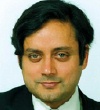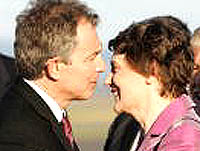Welcome to members and friends of the South Asian Journalists Association visiting after hearing the interview with Shashi Tharoor discussed below. Your questions, comments and suggestions are welcome.
India’s nominee for UNSG Shashi Tharoor participated in an Skypecast Q&A this morning hosted by the South Asian Journalists Association (SAJA), discussing what he views as “the most transparent race there ever has been for the Secretary-Generalship.”
Host Sree Sreenivasan, with the Columbia University School of Journalism, started the interview by asking Tharoor about his recent travels around the world to present his credentials. Tharoor jokingly responded by noting how this year’s selection presented unprecedented challenges for the candidates.
 “…this used to be a job for which people didn’t have to campaign. I remember Kofi Annan when he entered the race in 1996 being able to do his work as Under Secretary General for Peacekeeping while the Security Council discussed names behind closed doors… [N]ow governments expect that if some candidates come to them, why shouldn’t all candidates come to them? And so it is necessary to go out and present one’s credentials to the world.”
“…this used to be a job for which people didn’t have to campaign. I remember Kofi Annan when he entered the race in 1996 being able to do his work as Under Secretary General for Peacekeeping while the Security Council discussed names behind closed doors… [N]ow governments expect that if some candidates come to them, why shouldn’t all candidates come to them? And so it is necessary to go out and present one’s credentials to the world.”
There are presently four official nominees under consideration, but several other names have been floated as possible contenders. Asked whether the “conventional wisdom” still applied and that these individuals will enter the fray late in the game, Tharoor noted that it was of course possible, but that new candidates would not be unknown “dark horses” as they would have been in previous years.
“The reason for that is that the emphasis on the need for transparency and openness on Security Council action on this and other issues has increased dramatically in recent months, and in the course of 2006, there have been a couple of unprecedented developments on the Security Council consideration of the Secretary-Generalship.”
Tharoor noted especially the push initiated by Canada to make the Security Council’s procedures more transparent as well as the India-led campaign for multiple nominations, and in response, the Security Council’s decision to consider only candidates openly nominated by member states.
“The four names that therefore came to the Council are the result of a more open process than has ever happened before, and the only way in which someone else could now emerge would be through the same process, through officially putting their name forward in a public manner to the Security Council…”
Yet he subtly discouraged any further challengers.
“…yet it doesn’t look like, if one looks at all the media, the names discussed in the media, it doesn’t look as if there are any plausible ones out there right now.”
Tharoor is the only candidate in the running who does not have political experience within his sponsoring government, a fact which has not gone unnoticed by his critics. But he suggested that a lack of parliamentary experience is, in actuality, an advantageous qualification in practical terms.
“…the Secretary General of the UN has in every case without exception been largly unknown diplomats or civil servants when they got elected; they were all people who emerged with the ability to run an organization that has become more and more complex over the years, and that is simply not analogous to running a government. [The UN is] a government in the sense of 192 prime ministers telling you what to do, so it’s not a job that someone who has actually been a prime minister or president would find particularly palatable. So for all of these reasons, I don’t really see any credible names out there…”
Of course, as Tharoor noted, he himself has served as an international civil servant from the age of 22 – he is now 50 – having worked on refugees and humanitarian issues, peacekeeping, management reform and, currently, as Under Secretary General for Communications. Asked the obvious question of why he is running for the post, Tharoor noted,
“I have a first-hand experience from the inside and from the ground up of some of the most important issues and challenges which a Secretary General can face… I also feel quite strongly that whereas being an insider may not be the ideal from everyone’s point of view because many feel that the UN needs a new broom to come in and sweep clean, but the UN is the kind of organization where an old broom can sweep cleaner because it will know where to sweep and how to sweep… we really have an extremely complex system which would be difficult for a purebred outsider to deal with. The learning curve for somebody who’s not familiar with the UN would be extraordinarily steep… [Most CEOs] brought into the UN would probably find themselves resigning in frustration in six weeks having to deal with a system where there are 192 countries looking over their shoulder and limiting very severely how much they can do.”
Following his nomination, there were Indian columnists which suggested that Tharoor’s nomination signaled an end to any chance for India to secure a permament Security Council seat. Asked about this, Tharoor’s explanation of the issues’ separate importance was both more eloquent (unsurprisingly) and much more informed than the usual response from Indian officials.
“Until there is agreement among 2/3 of the member states about a formula for Council expansion, a formula that can then be ratified by 2/3 of the world’s parliaments including those of all five permanent members, until that happens, there will not even be a framework within which India can seek a permanent seat. And that will take time, whereas the Secretary-Generalship will be decided one way or the other within the next few months.
…[I]t is important to understand that the unwritten convention… rests on the fundamental principle that no one country should be afforded the right to initiate action of the United Nations through the SG and stop action through the veto. Now, that doesn’t apply in the Indian case. India is not currently a permanent member of the Security Council, and should it obtain this status, it has already agreed to forego the veto for 15 years. So the next Secretary General, whether me or somebody else, is not going to have to face a veto-wielding India.
…I don’t see why Indian columnists should be suggesting that India should deny itself a candidacy for the Secretary-Generalship in the name of a Security Council seat it doesn’t actually have and when there isn’t yet a framework within which it can pursue such a seat.”
In addition to discussing the selection process and his own qualifications in standing for the post, Tharoor answered questions from listeners about the Israeli-Palestinian conflict, Iran’s nuclear program and addressing religious intolerance. Tharoor noted that he is having to do a bit of “running around” to catch up with the other candidates in presenting his credentials. Tomorrow he will be in Washington, followed by visits to Security Council members Argentina, Slovakia, Denmark and the United Kingdom in the coming weeks.
Asked what his plans were should he not be nominated by the Security Council, Tharoor’s response reflected the more aggressive, campaign-oriented approach typical of national elections but unheard of until now in choosing the UNSG.
“I don’t have a Plan B. Never did and don’t now. I’ve really devoted my adult working life from the age of 22 to working for the United Nations so you’ll really forgive me for not having entertained any other possibilities. If this doesn’t work, then I will have to start thinking about it, and of course, all good ideas will be welcomed. But at this stage, I am very much focused on a race I intend to win.“

 Sir Brian is widely regarded for his proposals for reforming the UNSG selection process. He wrote what is considered the
Sir Brian is widely regarded for his proposals for reforming the UNSG selection process. He wrote what is considered the 
 “…this used to be a job for which people didn’t have to campaign. I remember Kofi Annan when he entered the race in 1996 being able to do his work as Under Secretary General for Peacekeeping while the Security Council discussed names behind closed doors… [N]ow governments expect that if some candidates come to them, why shouldn’t all candidates come to them? And so it is necessary to go out and present one’s credentials to the world.”
“…this used to be a job for which people didn’t have to campaign. I remember Kofi Annan when he entered the race in 1996 being able to do his work as Under Secretary General for Peacekeeping while the Security Council discussed names behind closed doors… [N]ow governments expect that if some candidates come to them, why shouldn’t all candidates come to them? And so it is necessary to go out and present one’s credentials to the world.” Rather, O’Sullivan writes, Helen Clark had a bit of a chat with her British counterpart Tony Blair about her entering the race for UN Secretary General.
Rather, O’Sullivan writes, Helen Clark had a bit of a chat with her British counterpart Tony Blair about her entering the race for UN Secretary General.



